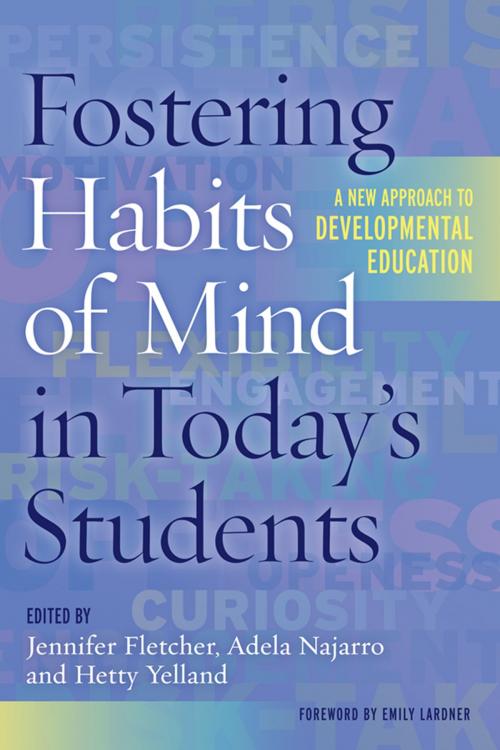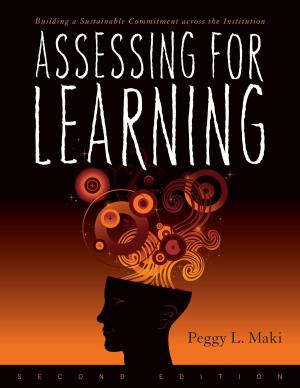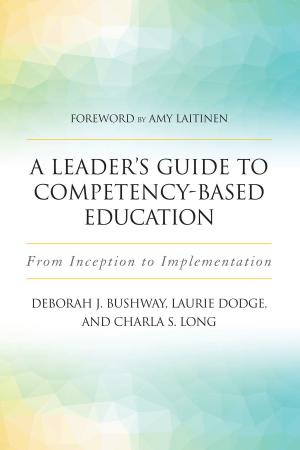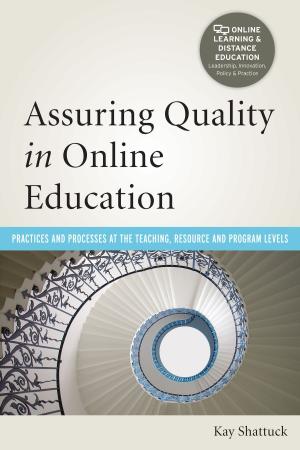Fostering Habits of Mind in Today's Students
A New Approach to Developmental Education
Nonfiction, Reference & Language, Education & Teaching, Higher Education| Author: | ISBN: | 9781620361825 | |
| Publisher: | Stylus Publishing | Publication: | September 30, 2015 |
| Imprint: | Stylus Publishing | Language: | English |
| Author: | |
| ISBN: | 9781620361825 |
| Publisher: | Stylus Publishing |
| Publication: | September 30, 2015 |
| Imprint: | Stylus Publishing |
| Language: | English |
Students need more than just academic skills for success in college and career, and the lack of an explicit instructional focus on the “soft skills” critical to postsecondary success poses a challenge for many students who enter college, especially the underprepared.
Based upon a multi-campus, cross-disciplinary collaboration, this book presents the resulting set of habits-of-mind-based strategies that demonstrably help all students. They promote life-long, integrative learning and foster intellectual qualities such as curiosity, openness, flexibility, engagement, and persistence that are the key to developing internalized and transferrable competencies that are seldom given direct attention in college classrooms.
This contributed volume, written with full-time and adjunct faculty in mind, provides the rationale for this pedagogical approach and presents the sequential instructional cycle that begins by identifying students’ assets, and progressively focusing on specific habits to develop their capacity to transfer their learning to new tasks and situations.
Faculty from both two-year and four-year colleges provide examples of how they implement these practices in English, math, and General Education courses, and demonstrate the applicability of these practices across course types and disciplines. By foregrounding habits of mind as an instructional lens, this book makes a unique contribution to teaching in developmental and general education settings.
Based upon a multi-campus, cross-disciplinary collaboration, this book presents the resulting set of habits-of-mind-based strategies that demonstrably help all students. They promote life-long, integrative learning and foster intellectual qualities such as curiosity, openness, flexibility, engagement, and persistence that are the key to developing internalized and transferrable competencies that are seldom given direct attention in college classrooms.
This contributed volume, written with full-time and adjunct faculty in mind, provides the rationale for this pedagogical approach and presents the sequential instructional cycle that begins by identifying students’ assets, and progressively focusing on specific habits to develop their capacity to transfer their learning to new tasks and situations.
Faculty from both two-year and four-year colleges provide examples of how they implement these practices in English, math, and General Education courses, and demonstrate the applicability of these practices across course types and disciplines. By foregrounding habits of mind as an instructional lens, this book makes a unique contribution to teaching in developmental and general education settings.
Students need more than just academic skills for success in college and career, and the lack of an explicit instructional focus on the “soft skills” critical to postsecondary success poses a challenge for many students who enter college, especially the underprepared.
Based upon a multi-campus, cross-disciplinary collaboration, this book presents the resulting set of habits-of-mind-based strategies that demonstrably help all students. They promote life-long, integrative learning and foster intellectual qualities such as curiosity, openness, flexibility, engagement, and persistence that are the key to developing internalized and transferrable competencies that are seldom given direct attention in college classrooms.
This contributed volume, written with full-time and adjunct faculty in mind, provides the rationale for this pedagogical approach and presents the sequential instructional cycle that begins by identifying students’ assets, and progressively focusing on specific habits to develop their capacity to transfer their learning to new tasks and situations.
Faculty from both two-year and four-year colleges provide examples of how they implement these practices in English, math, and General Education courses, and demonstrate the applicability of these practices across course types and disciplines. By foregrounding habits of mind as an instructional lens, this book makes a unique contribution to teaching in developmental and general education settings.
Based upon a multi-campus, cross-disciplinary collaboration, this book presents the resulting set of habits-of-mind-based strategies that demonstrably help all students. They promote life-long, integrative learning and foster intellectual qualities such as curiosity, openness, flexibility, engagement, and persistence that are the key to developing internalized and transferrable competencies that are seldom given direct attention in college classrooms.
This contributed volume, written with full-time and adjunct faculty in mind, provides the rationale for this pedagogical approach and presents the sequential instructional cycle that begins by identifying students’ assets, and progressively focusing on specific habits to develop their capacity to transfer their learning to new tasks and situations.
Faculty from both two-year and four-year colleges provide examples of how they implement these practices in English, math, and General Education courses, and demonstrate the applicability of these practices across course types and disciplines. By foregrounding habits of mind as an instructional lens, this book makes a unique contribution to teaching in developmental and general education settings.















